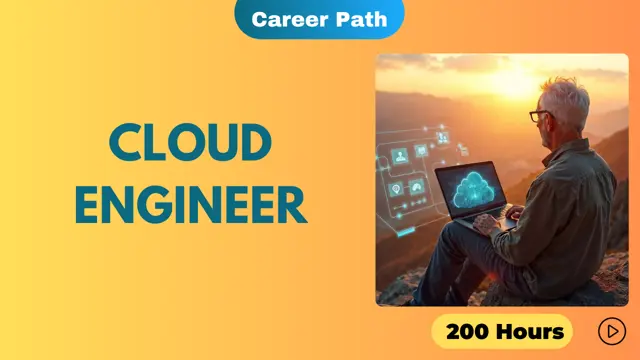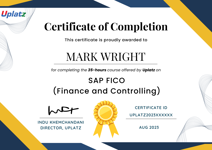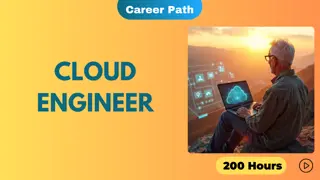
Cloud Engineer Career Path
Self-paced videos, Lifetime access, Study material, Certification prep, Technical support, Course Completion Certificate
Uplatz
Summary
- Uplatz Certificate of Completion - Free
Add to basket or enquire
Overview
Uplatz offers this comprehensive Career Path program on Cloud Engineer. It is a self-paced program consisting of video lectures on all courses related to cloud engineering. You will be awarded Course Completion Certificate at the end of the course.
An IT professional who builds and maintains cloud infrastructure is known as a cloud engineer. Cloud engineers can work in a variety of roles, including cloud architecting (designing cloud solutions for businesses), development (cloud coding), and administration (working with cloud networks). In recent years, cloud computing has become commonplace. In fact, you almost certainly use cloud-based technology on a daily basis. Cloud technology allows you to watch TV or listen to music on your favorite streaming services, use an online email platform, and back up your phone pictures to the internet. For a business, this means that data can be stored and backed up more easily, software updates can be pushed out on demand, and customers may be able to access their data from multiple devices. You'll work behind the scenes as a cloud engineer to keep everything running smoothly.
To be successful in their roles, cloud engineers must hone specific cloud computing skills. These skills include everything from software development and database administration to change management and data security. It's also crucial to pay attention to details and work as part of a team. These abilities are similar to those acquired in a typical computer science course or by a professional working in a traditional on-premise computing environment. Many other computer science principles, such as computation, data structure, and system architecture, are also applicable to cloud computing. While there is often overlap between computer science and cloud computing coursework, there is value in specialized education and training for a career in cloud engineering. Specialized training in two key areas can help cloud engineers: gaining hands-on experience with cloud platforms and understanding how cloud resources are allocated and paid for.
This Cloud Engineer Career Path program is for you if you're looking for a Cloud Engineering, it will help you become an expert in cloud implementation design, planning, and scaling. Our Cloud Engineering course will teach you how to design and deploy dynamically scalable and reliable applications on three popular cloud platform providers: Microsoft Azure, Amazon Web Services, and Google Cloud Platform. As companies continue to adopt cloud technology, cloud engineering is expected to grow in the next decade. Along with cybersecurity and database management, the ability to work with cloud technology will be one of the most in-demand skill sets in 2022.
How to become a Cloud Engineer
1) Develop the required skills through education - The education requirements for cloud engineering positions may be ambiguous at times, earning a degree or certificate in a related field can help you stand out. While some employers may prefer candidates with a bachelor’s degree, others require a Mater's Degree of Computer Science or related field.
2) Knowledge of leading cloud service providers and their platforms such as AWS, Azure, Google Cloud, IBM Cloud, Oracle Cloud, Salesforce, and so on
3) Programming skills, such as SQL, R, and Python
4) Cloud security
5) Machine learning and artificial intelligence
6) Development and maintenance of databases
Certificates
Uplatz Certificate of Completion
Digital certificate - Included
Course Completion Certificate by Uplatz
Course media
Description
Course Objectives
- Assisting businesses with the migration of their computer systems to the cloud
- Setting up cloud infrastructure components such as networking and security.
- Developing cloud-based applications and databases
- Keeping a close eye on cloud management and data storage services
Key skills required as a Cloud Engineer
Education: To work as a cloud engineer, applicants are required to have a minimum of Bachelor of Science degree in Computer Science, or Engineering, or in other related technical field.
Certification: it is important that they have relevant cloud certifications such as Microsoft Certified Azure Solutions Architect or AWS Cloud Practitioner.
Knowledge: A cloud engineer must have adept technical skills and cognate experience to be hired. Employers seek expertise in a combination of the following areas: Practical object-oriented development knowledge with at least Scala or Java, knowledge of systems like ZooKeeper, Consul etc.
Collaborative skills: Part of the daily tasks of a Cloud Engineer is to work with cross-functional teams (Product Owners, Scrum Masters, Developers, Designers, and Business Analysts).
Communication skills: The cloud engineer works with people, including IT professionals and non-IT experts, so it is crucial that they have an exceptional verbal, presentation, and written communications skills to convey information clearly to the different audience.
Who is this course for?
Everyone
Requirements
Passion to learn and succeed!
Career path
- Cloud Engineer
- AWS / Azure / Google Cloud Engineer
- Cloud Architect
- Software Engineer
- Platform Architect
- Solution/Data Architect
- Machine Learning Engineer
- Data Scientist
- Cloud Computing Engineer
- Software Developer
- Technical Architect
- Systems Analyst
- Data Analyst
Questions and answers
Currently there are no Q&As for this course. Be the first to ask a question.
Reviews
Currently there are no reviews for this course. Be the first to leave a review.
Legal information
This course is advertised on Reed.co.uk by the Course Provider, whose terms and conditions apply. Purchases are made directly from the Course Provider, and as such, content and materials are supplied by the Course Provider directly. Reed is acting as agent and not reseller in relation to this course. Reed's only responsibility is to facilitate your payment for the course. It is your responsibility to review and agree to the Course Provider's terms and conditions and satisfy yourself as to the suitability of the course you intend to purchase. Reed will not have any responsibility for the content of the course and/or associated materials.



